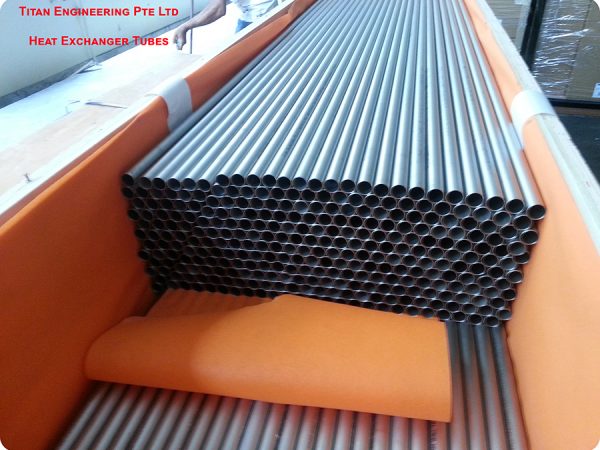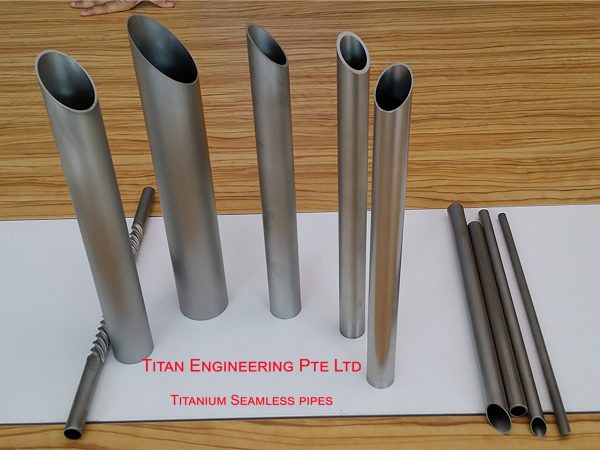TITANIUM TUBES- SEAMLESS & WELDED
Titan Engineering is a distributor of high quality titanium seamless & welded tubing certified to ASTM B338, ASME SB338, and EN 01204 Type 3.1. Specializing in boiler tubes, condenser tubes, heat exchanger tubes, ferrules, and boiler tube plugs. Our customers include mechanical contractors, vessel fabricators, original equipment manufacturers, fabricators, end users, utility power plants, Oil & Gas refineries and other distributors located throughout the South East Asia region. We highly specialize in supplying titanium Gr2 SMLS & welded tubes to the Oil & Gas industry process equipment manufacturers.
Titanium is mainly classified into two categories, commercially pure CP Grades and alloys with additives such as aluminum and vanadium. We are a titanium tubing supplier, and our inventories consist of both types and cover both seamless and welded methods of manufacture.
Titanium Tubes for Pressure Vessel Applications:
-
- Pulp and paper industry
- Marine Industry.
- Chemical and petrochemical industry
- Sporting goods – golf shafts, bicycle frames, etc.
- Flow Ice machines
A titanium heat-exchanger or condenser is a heat-transfer equipment, made up of commercially pure titanium, that is used for transfer of internal thermal energy between two or more corrosive fluids. As stainless steel will corrode very fast when in contact with corrosive fluids or chemicals, CP titanium is used. Titanium tubes manufactured to ASME SB-338 / ASTM B338 are widely used in the fabrication of tubular heat exchangers. The tubular heat exchanger mainly covers double-pipe heat exchanger, shell and tube heat exchanger, and coiled tube heat exchanger. The titanium tubes can be furnished in either seamless or welded style.
In chemical process industries, the use of Titanium Heat Exchangers has been found to be a cost-effective method of resisting leaks from corrosion on a process line. Titanium Heat Exchangers are highly cost-effective over the entire life cycle of the equipment. Properly maintained, Titanium Heat Exchangers can operate for decades, making them a very economical choice. In 2022, we supplied titanium tubes for a titanium re-tubing project, the original titanium condenser was installed in 1980 – worked for four decades. Contact our Singapore office or our Jakarta Office.
The high resistance of titanium to corrosion prevents buildup of corrosion products which rob other metals of heat transfer efficiency. Titanium’s hard, smooth surface also minimizes buildup of external fouling films and makes cleaning and maintenance easier. The excellent resistance of titanium to turbulence and erosion-corrosion permits use of relatively high flow rates of 18-22 ft./sec. in silt-laden seawater or even up to 100 ft./sec. in clean seawater without damage to the passive oxide film.
Tests in 80°F (27°C) sea water for 60 days at 25 ft./sec. have shown titanium’s corrosion-erosion resistance to be 80 times better than that of the next-best material, a copper-nickel alloy. Other tests in 85°F (29°C) sea water for 60 days at 27 ft./sec. proved titanium to be almost 100 times better than stainless steel, the next-best material.
Putting it all together – the resulting overall heat transfer rate of titanium surfaces is often comparable to that of metals with higher thermal conductivity. The overall heat transfer coefficient of titanium in a desalination environment equalizes to that of 90-10 copper nickel after a short operating period. The copper-nickel alloy, due to its higher thermal conductivity, had a higher overall heat transfer coefficient when first placed in service with clean surfaces. However, as fouling due to corrosion product proceeded on the 90-10 alloy with time, the heat transfer coefficient dropped to a value equal to that of titanium which did not experience corrosion product fouling.
My boss calls me “The computer”
Not because of my calculation skills but because I go to sleep when left unattended for 15 minutes.😊



